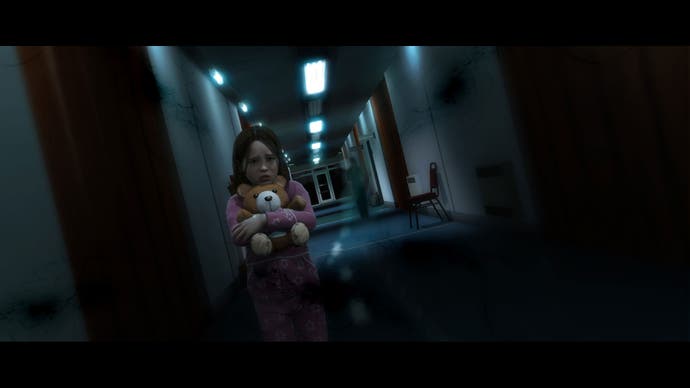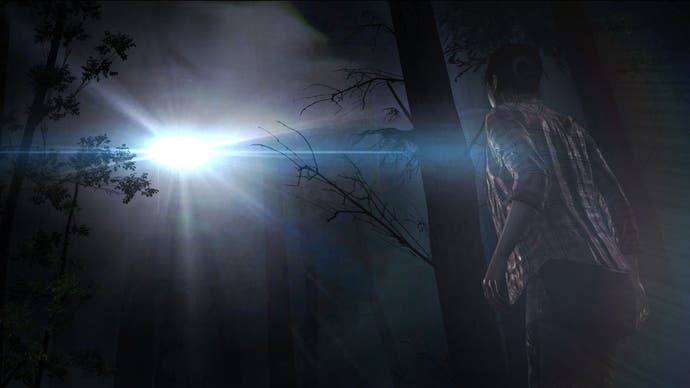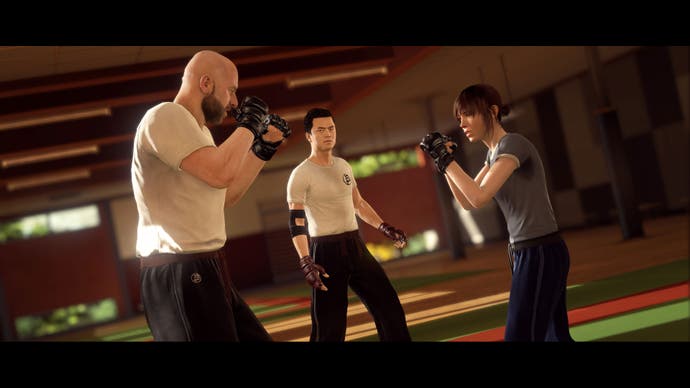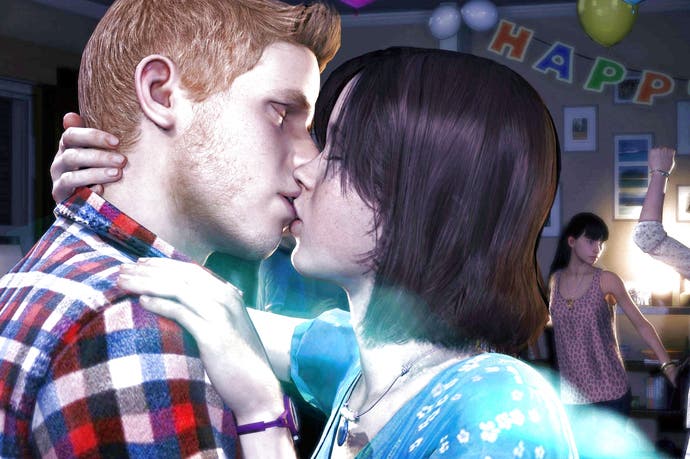How Beyond walks the line between arthouse and grindhouse
Juggling monsters and melancholy in David Cage's latest interactive drama.
SPOILER WARNING: This preview is based on playable code containing the first third of the game. Although it doesn't mention anything about the way the story might end, given the emphasis of narrative in Beyond: Two Souls' design there are still details here that some players may wish to discover for themselves.
"Thank you for supporting Interactive Drama". So read the little PlayStation Trophy message that pinged up after players had successfully steered Ethan Mars through the accidental death of his son in Quantic Dream's Heavy Rain, back in 2010. It was a small flourish that took a mood-breaking totem of modern gaming and turned it into statement of intent, a slogan for David Cage's relentless drive to bring cinema's auteur theory into gaming.
Whether Beyond: Two Souls follows suit, we can't yet say; the preview build contains the first third of the game, but no Trophies. What it does show is how Cage has refined and expanded his repertoire of "interactive drama" techniques in the three years since we first pressed X to shout "Jason!"

Rather than the three-pronged serial killer narrative of Heavy Rain, this is a much more intimate story, concerned with just one lead character. Jodie is a young woman who, ever since birth, has been connected to an invisible entity she calls Aiden. It's both a blessing and a curse, as Aiden is fiercely protective of Jodie, but also serves to isolate her, leaving her withdrawn and awkward, ostracised by her peers for being a freak.
This is also a very non-linear tale. Rather than long, continuous overlapping chapters, Beyond: Two Souls is made up of shorter and more fragmented scenes drawn from throughout Jodie's life. We first meet her in a rural sheriff's office - a scene that's been used to demo the game in the past - as a SWAT team descends to take down the apparently defenceless girl. But from the bloody aftermath of that ill-advised intervention, we cut back to a much younger Jodie, taking part in a series of parapsychology tests under the supervision of Willem Dafoe's government scientist, Nathan Dawkins.
It's the same "pick a card" test so memorably demonstrated by Venkman at the start of Ghostbusters, except here we literally get to experience it from the other side, playing as Aiden. A button press detaches you from Jodie, allowing you to float freely around the surrounding area. You can float through the one-way glass and eavesdrop on Dawkins and his team, before slipping into the room next door to see which card has been chosen. It's simple stuff, but there's an illicit thrill to being the unseen interloper that feels incredibly powerful.
And make no mistake, Aiden is powerful. Objects you can interact with are marked with a blue spot, and you can focus on this by holding R1. The thumbsticks can then be manipulated to affect the object - or person - in front of you. Pulling the sticks down and releasing them results in a shove. Electronic items can be scrambled, or you can possess people, making them walk around until shaken from their fugue state by confused co-workers.
It's a wonderful scene, and a lot of fun, allowing you to play the mischievous poltergeist before escalating the scenario, twisting scientific curiosity into abject panic as you wreak increasingly violent havoc. It also offers a lot more freedom than Heavy Rain ever did. Aiden's roaming is constrained - it hurts Jodie if he gets too far away and you can only interact with specific objects at certain times - but it's undeniably liberating to float through walls and freak people out.
"For all the pre-release emphasis on the story of a young woman and her spooky secret, the game definitely seems to have Cage's tendency to drift into silly pulp excess."

For most of the game - or at least the chunk of it available here - you'll be playing as Jodie, however. Her interactions with the world are more subtle than the ones in Heavy Rain, with fewer button pressing moments and more attention given to the right stick. A white dot marks the objects Jodie can use, and a flick of the right stick in the relevant direction will make her interact with them. The same is true of the game's combat.
Yes, there's combat, both hand-to-hand and even a spot of stealthy gunplay, which appears during a training montage as Jodie is recruited into the CIA. Again, there's a greater fluidity to these inputs. During attacks animations, time slows down slightly and you flick the right stick in the same direction as Jodie's movements. If she's punching to the right, you flick right to make the blow land. If she's ducking or recoiling, you flick down or back. It's simple and graceful, if not particularly challenging. The moments when you fail seem to come from unclear animation where it's hard to discern which movement you should be following.
There's a lot of action in the game, whether it's Jodie fending off government agents atop a speeding train or Aiden protecting her during a street siege by throwing cars around, detonating a petrol station and crashing a helicopter. Later still, there's an accident at the lab when a portal to the "other side" goes haywire and spills dozens of phantasmic tentacled apparitions into our world. As the only person with experience of these creatures, Jodie is sent in alone to shut it down.
It's a tense section - as close as the game gets to survival horror - but it's also a rather jarring one, distractingly blockbustery in both concept and execution, as Jodie battles zombified corpses and scrambles across raised walkways pursued by tangible monsters. For all the pre-release emphasis on the story of a young woman and her spooky secret, the game definitely seems to have Cage's tendency to drift into silly pulp excess.
Yet there are also plenty of quieter moments where Ellen Page gets to do some honest to goodness acting. We get glimpses of her life before being taken to the research base, as her "gift" makes life impossible for her foster parents. A scene in which a six or seven year old Jodie mopes about the house on a snowy day is acutely observed, with motion capture lending her movements a credible recreation of the floppy, fidgety energy of a young child.
More impressive still is a chapter in which a teenage Jodie is allowed to attend a birthday party. She doesn't know the girl in question - her mother just works in the same unit where Jodie lives - and the whole scene simmers with the awkward cruelty of young adults. There's an endearing awkwardness to Jodie in this scene, especially as she tries to dance on her own. It's a quick time event, basically, but one that works whichever way you take it. Mess it up and she dances like a dork. Get it right and she's lost in her own world. Either way, she's an outsider and things quickly take a turn for the mean.
There are choices here: try a beer or a joint? Keep a handsome young man at arm's length or succumb to his clumsy seduction? Try to fit in with the others by agreeing to demonstrate Aiden's power? And, after things inevitably turn sour, do you slink off to lick your wounds or turn Aiden loose on the brats to teach them a lesson?
"There are arthouse moments of simple human drama here, just as there are stealth takedowns and explosive action scenes."

These are the sort of quandaries that Cage excels at; small human moments that may or may not have later significance, but which force the player to consider the character in that moment and act accordingly. They're all deftly handled here, but also - it seems - ultimately pointless. Replay the chapter and do everything differently and the events still unfold in much the same way. Agree to smoke a joint, and you have to go through with it: there's no way to put it down until you toke, even if you regret the choice. Without seeing the rest of the game, it's impossible to know whether your actions here will have repercussions, but it's undeniably jarring to see the same responses used in response to radically different inputs, and characters forced down strictly defined paths with no turning back.
At least the performances have been vastly improved, both in terms of movement and conviction. Jodie is a far more compelling protagonist that the stiff Ethan Mars, and Ellen Page imbues her with real heart and depth, while Willem Dafoe - an occasional but notable presence - has real gravitas as her surrogate father, who nonetheless keeps pushing her to help his research. Both are clearly recognisable in the game, not just through their voices but their mannerisms - right down to small twitches of the eyes, a curl of the mouth, that is eerily realistic. Then you try and steer Jodie somewhere the game doesn't want you to go, and these lifelike human avatars are crudely shoved back on track like robots.
That's been the dichotomy at the heart of everything David Cage has done, of course. That tension between the structure of a scripted story and the player agency that the gaming medium promises. You're always as much an actor as a player in a David Cage game, and like a true auteur improvisation is tolerated only where it steers the story in a direction that has already been approved. Jodie's story definitely feels like one worth telling, then, but it can't be denied that the medium has changed a lot even in the short time since Heavy Rain. Back then, smaller, gentler indie narrative games like Gone Home weren't making headlines, and "interactive drama" was a much smaller niche that Cage could define as he saw fit.
There are arthouse moments of simple human drama here, just as there are stealth takedowns and explosive action scenes. Can Beyond's lurid world of psychic espionage and catastrophic hell portals reconcile itself with the more intimate demands of Jodie's personal journey? Whatever the answer, finding out promises to be a typically memorable experience.



.png?width=291&height=164&fit=crop&quality=80&format=jpg&auto=webp)




.jpg?width=291&height=164&fit=crop&quality=80&format=jpg&auto=webp)
